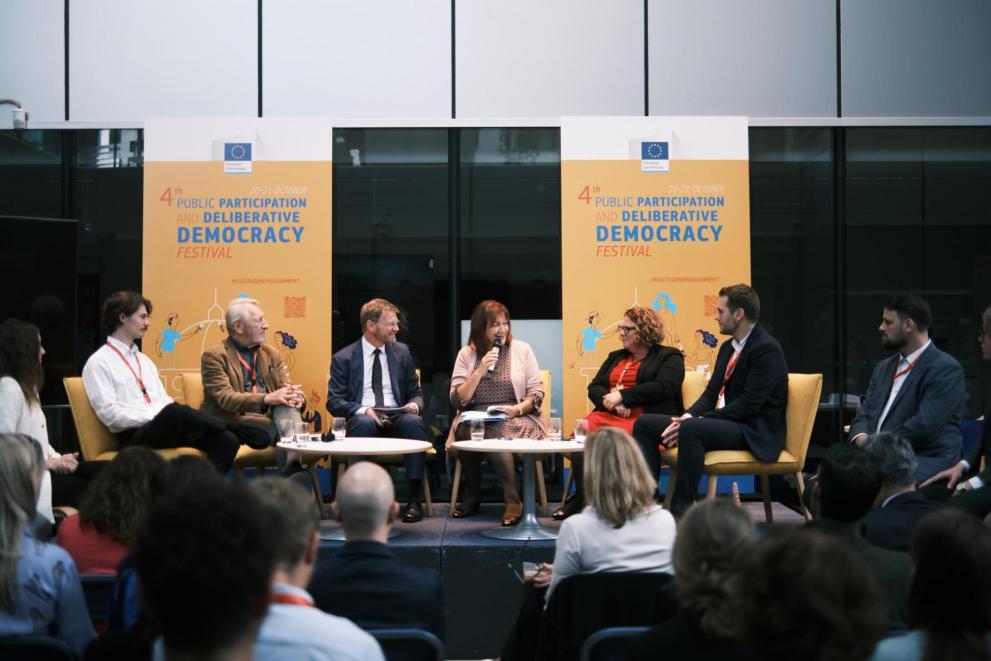Vice-President Šuica: "Citizens should be at the heart of EU policymaking"
You participated in a session on civic education, discussing its future with citizens from different generations and EU countries. What was your takeaway?
Citizens shared the deliberations from intergenerational dialogues in Croatia, Denmark and Slovakia about the future of civic education. What I heard reaffirmed that in our schools, academies, universities, we should nurture democratic values, critical thinking and constructive engagement. We need learning environments that encourage and teach people to engage in participatory democracy, which helps them develop practical citizenship skills.
If we want to build resilient democracies, it is important to also engage the youngest generation. We are establishing the EU Children's Participation Platform as a response to calls from young people for closer involvement. But we learn throughout our whole lives. I believe there is space for life-long learning here.
How do you see the state of democracy in the world?
Globally, democracies face a number of challenges. There is no one solution. I think it is, first and foremost, about trust. And if people feel left behind, that threatens the foundations of democracy. This can feed into extreme positions across the political spectrum.
We can build democratic resilience from within by empowering citizens and developing a European civic identity. This can be achieved by enhancing engagement and participation in democracy, through both education and communication. Action and engagement at the local, regional and national levels underpin the potential for successful democratic resilience at the EU-level.
Do you see any positive developments for democracies?
Democracy is the best and there is nothing better. We see a significant global momentum around citizen engagement, participatory and deliberative democracy. So in 2020, we adopted the European Democracy Action Plan, setting out measures to build capacity and infrastructure for deliberative civic engagement and political participation.
This global Deliberative Wave is marked strongly by the Conference on the Future of Europe, which builds on previous EU efforts, including citizens' assemblies, juries, and panels in Member States - for example the Citizens Convention for Climate in France or the Citizens' Assembly in Ireland.
Democracy constantly evolves. And we must evolve too. Today citizens want to have their say beyond elections. Participatory and deliberative democracy methods offer us innovative ways to do this.
A positive development is that we are following-up on the proposals of the Conference by integrating them into the Commission Work Programme for 2023. Inspired by the Conference, a new generation of citizens' panels will become a regular feature of our democratic life. The first ones will deliberate on initiatives on food waste, learning mobility and virtual worlds.
Where can we see citizens already engaged in European policies?
There are several examples. One is EU Missions, within the Horizon Europe research and innovation programme. Another example is EU Cohesion Policy, which supports regions and cities to develop participatory and deliberative infrastructure. And, since mid-September 2021, the Commission has registered 10 new European Citizens' Initiatives.
In addition, the public can provide input throughout the whole policy cycle via the online Have Your Say consultation platform, which we are upgrading to bring together all citizens' engagement mechanisms of the Commission. This is part of building an innovative ecosystem for democratic innovation. Democracy itself is not static, so politicians and institutions must also be capable of adapting to respond to citizens' needs.
What role do you see for the Commission's Competence Centre on Participatory and Deliberative Democracy?
The demand for capacity support and expert advice for participatory and deliberative projects continues to grow, as the Commission and other EU institutions engage more deeply with citizens on EU policies. This is where the Competence Centre run by the JRC has a crucial role. The centre, launched in October 2021, builds on 30 years of work that has been carried out on citizen engagement, participatory and deliberative democracy. It functions as a hub of knowledge and expert advice to train and help others new to this field, and who are about to launch or are in the process of launching a citizen engagement project.
I appreciate how it functions as one of the centres of a dense European and global network of activists, experts, policymakers, researchers and others who work on engaging citizens in policymaking and science.
What is next on citizen's engagement and deliberative democracy at the Commission?
We have many experiences to share and look forward to benefiting from the perspectives of others. Together with Ireland, the Commission is co-leading the cohort on Deliberative Democracy and Citizens Assemblies leading up to the second US Summit for Democracy in 2023. If we learn from each other, that will help to strengthen the resilience of democracies across the globe.
Read the full interview here: https://joint-research-centre.ec.europa.eu/jrc-news/vice-president-suica-citizens-should-be-heart-eu-policymaking-2022-10-25_en

